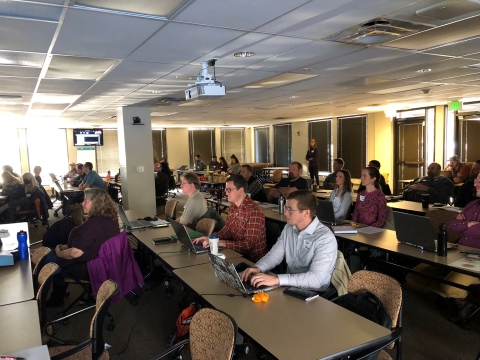As part of a national effort to respond to a changing climate, the U.S. Fish and Wildlife Service (Service) has identified a number of priorities and objectives that aim to unify the Service’s approach to climate adaptation and mitigation. One of the priorities identified is to “develop a climate literate workforce that has the knowledge, skills and abilities to successfully address climate adaptation and mitigation needs throughout all programs and regions of the Service.”
To achieve this goal, a team of experts from the Service and partners with the U.S. Geological Survey (USGS) Climate Adaptation Science Centers (CASCs) developed a training course for grassland managers. This training course was comprised of an optional self-paced introductory climate science course, four webinars, and an in-person workshop. Building upon the collective efforts across the Service dedicated to Grassland Conservation, the in-person workshop was designed to focus on the grassland ecosystem and how managers can incorporate climate change climate change
Climate change includes both global warming driven by human-induced emissions of greenhouse gases and the resulting large-scale shifts in weather patterns. Though there have been previous periods of climatic change, since the mid-20th century humans have had an unprecedented impact on Earth's climate system and caused change on a global scale.
Learn more about climate change considerations into their decision-making. On January 24th and 25th of 2023, 35 Service staff and partners gathered in Lakewood, Colorado for the first-ever Grasslands-Climate Workshop.
The workshop used a broad Learn-Do-Reflect approach and included information delivery, hands-on tool training, peer-to-peer networking, and a scenario-based exercise. The workshop focused on Central North American Grasslands (Tallgrass, Northern Mixed Grass, Central Mixed Grass and Shortgrass Ecoregions and the Sagebrush-Grassland Ecotone) with some relevance to southern and montane grassland systems.
The workshop was led by seven Climate Science and Adaptation trainers and a roster of experts from partner organizations, including the Midwest, Northwest, North Central, and South Central CASCs and the Northern Institute of Applied Climate Science (NIACS), as well as others who provided instruction on a range of topics: Climate Toolbox, the Resist-Accept-Direct Framework, Interpreting and Using Vulnerability Assessments; Adaptive Capacity Assessments; and Climate Adaptation Workbooks.
The Scenario Exercise challenged participants to build out a climate informed management plan for example species (grasshopper sparrow, regal fritillary) on example landscapes in the Dakotas, Nebraska and Kansas. Participants were asked to use a tool they learned about earlier in the workshop to identify a range of plausible climate futures, and apply other skills gained during the workshop to evaluate the focal species’ sensitivity and exposure, identify potential adaptation approaches that individuals might use to deal with unsuitable future climates, and develop sets of management actions that managers could use to mitigate climate impacts on long-term persistence for their focal species.
Post-workshop evaluations were collected to gauge how participants responded to the training. Most participants reported that the workshop substantially increased their knowledge of climate change and potential adaptive management measures they may use. Emma Kuster, one of the workshop coordinators, shared that “the training series provided participants with experience on how to make management decisions in light of climate change. We brought together expertise from the Service and the CASCs, as well as the National Park Service, and NIACS to build an interactive activity that walked participants through the climate adaptation planning process and introduced them to new tools and ways of thinking about the challenges that they face.”
One participant shared their thoughts on the scenario exercise in particular: “Drilling down to places and species helped narrow an almost overwhelming amount of climate information, to what are a few of the most important things to consider. This helped me focus on potential ecological consequences and what we might be able to do.” Participants shared that this type of training program would be useful for resource managers and stewards in other ecosystems.
This workshop confirmed that climate literacy varies widely among Service staff and partners. Focused trainings, like this Grasslands-Climate Workshop, can effectively address this information gap across multiple Service programs. In fact, bringing staff from multiple Programs into a common training environment helped participants understand climate impacts and potential adaptive actions across the range of Service responsibilities, ultimately helping staff better contribute to the Service’s mission. Even our best efforts cannot reach all Service staff but hopefully, workshop participants will share the knowledge they gained and the tools they learned about with colleagues and partners.
This workshop was collaboratively organized by the North Central CASC, Northwest CASC, South Central CASC, and Service staff. For further inquiries about the training, contact Elise Elliott-Smith (eelliott-smith@usgs.gov) or Emma Kuster (emmakuster@ou.edu).




